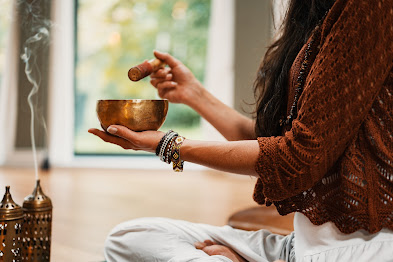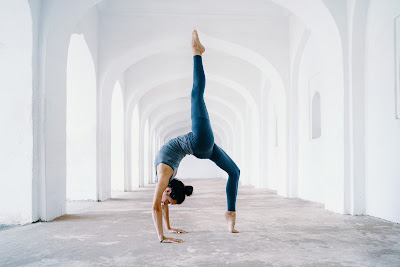The Art of Relaxation: Ways to De-Stress and Improve Your Mental Health
"Almost everything will work if you unplug it for a few minutes...including you." - Anne Lamott
Hello Everyone, Welcome to our blog. Today we are going to discuss another article that emphasizes your mental health and wellness. Stress and anxiety have become the norm in our fast-paced world, making it challenging to find moments of peace and relaxation. However, taking time to de-stress and relax is crucial for our mental and physical health. In this blog, we will discuss practical tips and strategies for incorporating relaxation into your daily routine.
Research has shown that stress and anxiety can have severe impacts on our mental and physical health. Chronic stress can lead to anxiety, depression, and other mental health disorders. It can also increase the risk of developing physical health problems like heart disease, digestive issues, and more.
Therefore, it's essential to prioritize relaxation time and take proactive steps to manage stress levels. In this blog, we will explore various relaxation techniques like mindfulness, connecting with nature, self-care, and social connection.
By incorporating these techniques into our daily lives, we can manage stress and improve our overall sense of well-being. So, let's learn the art of relaxation together and take the first step towards a happier and healthier life.
Understanding the Impact of Stress on Your Mental Health
Stress can have a severe impact on our mental health, causing physical symptoms like headaches, muscle tension, and fatigue, as well as emotional symptoms like anxiety, irritability, and depression. In this section, we will dive deeper into the effects of stress on our overall well-being and highlight the importance of managing stress effectively.
By understanding how stress can impact our mental health, we can take proactive steps to prevent it from becoming overwhelming and improve our overall sense of well-being. So, let's explore the impact of stress on our mental health and learn how to manage it effectively.
Physical Symptoms of Stress:
Stress can manifest in various physical symptoms that affect our daily lives. Headaches, muscle tension, chest pain, and fatigue are common physical symptoms of stress. It can also cause sleep problems, making it difficult to fall asleep or stay asleep.
Over time, chronic stress can weaken our immune system, making us more susceptible to illnesses. It's essential to recognize these physical symptoms of stress and take steps to manage them effectively.
Emotional Symptoms of Stress:
Stress can have a profound impact on our emotional well-being, causing feelings of anxiety, irritability, and sadness. It can also affect our ability to concentrate and make decisions, leading to decreased productivity and increased stress levels.
Prolonged stress can even lead to more severe mental health disorders like anxiety, depression, and burnout. Recognizing these emotional symptoms of stress is crucial for managing stress effectively and maintaining our mental health.
Preventing Overwhelming Stress:
Taking proactive steps to manage stress is crucial for preventing it from becoming overwhelming. Regular exercise, a healthy diet, and adequate sleep can help reduce stress levels. Mindfulness practices like meditation, yoga, and deep breathing exercises can also be beneficial in managing stress.
It's essential to prioritize self-care and engage in activities that bring joy and relaxation to our lives. Social connection is also crucial for managing stress, so don't hesitate to reach out to loved ones and seek support when needed. By taking proactive steps to manage stress, we can improve our overall well-being and maintain our mental health.
Overall, Stress can have a significant impact on our mental health, leading to various physical and emotional symptoms. However, taking proactive steps to manage stress can prevent it from becoming overwhelming and improve our overall sense of well-being. In the next section, we will explore practical relaxation techniques that can help reduce stress levels and improve mental health.
Incorporating Mindfulness into Your Daily Routine
Mindfulness is a simple and effective way to improve our mental health and manage stress. By focusing on the present moment and being aware of our thoughts and feelings, we can gain greater insight into our mental and emotional states. This increased awareness can help us recognize patterns of negative thinking or behavior that may be contributing to stress and anxiety, and make positive changes to promote overall well-being.
Incorporating mindfulness into our daily routines can be achieved through a variety of practices. From taking a few minutes to focus on our breath to attending a yoga or tai chi class, there are many ways to cultivate mindfulness and promote relaxation. By making mindfulness a part of our daily routine, we can develop a greater sense of calm and self-awareness, and improve our ability to manage stress and maintain our mental health over the long-term.
Meditation:
Regular meditation practice can have significant benefits for mental health and well-being. By training our minds to focus on the present moment and let go of distracting thoughts, we can cultivate a greater sense of calm and reduce the impact of stress on our lives. Whether practiced in a quiet room or during daily activities, meditation can be an effective tool for managing stress and improving emotional regulation.
Research has shown that even short periods of daily meditation can have a positive impact on mental health. By dedicating just a few minutes a day to meditation, we can cultivate a sense of inner peace and calm that can carry over into all aspects of our lives. Meditation can also improve our ability to connect with others and be present in our relationships, which can have a profound impact on our overall well-being.
Checkout our another post on meditation for more info
Snooze in Serenity: How Meditation Can Improve Your Sleep Quality
Deep Breathing Exercises:
Deep breathing exercises are a simple yet effective way to incorporate mindfulness into your daily routine. By focusing on your breath and taking slow, deep breaths, you can quickly shift your body into a more relaxed state. This can be particularly useful during times of high stress or anxiety when you need to calm your mind and body quickly.
One of the benefits of deep breathing exercises is that they can be done almost anywhere and at any time. Whether you're at work, at home, or out in public, you can take a few minutes to focus on your breath and bring your attention back to the present moment. Regular deep breathing practice can also help build resilience to stress over time, allowing you to manage stress more effectively in the long run.
Checkout our another post on Deep breathing for more info
Breath Your Way to Better Sleep: Unlocking the Power of Breathing Techniques
Mindful Movement Practices:
Mindful movement practices like yoga or tai chi offer a unique way to incorporate mindfulness into physical activity. Yoga, for example, involves various poses that promote strength, flexibility, and relaxation. Practicing yoga regularly can help reduce stress, anxiety, and depression, and improve overall well-being. Similarly, tai chi involves slow, gentle movements that promote relaxation and mindfulness. Regular tai chi practice has been shown to improve balance, flexibility, and cognitive function, as well as reduce stress and anxiety.
Incorporating mindfulness practices like meditation, deep breathing exercises, and mindful movement into your daily routine can be a powerful tool for managing stress and promoting overall well-being. It's essential to find a practice that resonates with you and fits into your schedule, whether it's a quick 5-minute breathing exercise or a longer yoga practice. With consistency and dedication, mindfulness can become an integral part of your self-care routine, helping you to live a more balanced and fulfilling life.
Checkout our another post on Yoga for more info
Unleash Your Inner Yogi: How Yoga Can Improve Your Mind, Body, and Spirit
Benefits of Mindfulness:
Incorporating mindfulness into your daily routine can have numerous benefits, including improved emotional regulation, reduced stress and anxiety, and greater feelings of calm and relaxation. It can also improve our relationships and help us connect more deeply with the world around us. By taking small steps to incorporate mindfulness into your daily routine, we can promote greater overall well-being and manage stress more effectively.
Additionally, mindfulness can also help increase self-awareness and reduce negative thought patterns, which can contribute to depression and other mental health issues. By practicing mindfulness regularly, individuals can learn to observe their thoughts without judgment and respond to them in a more positive and constructive manner. This can lead to a more positive outlook on life and a greater sense of personal fulfillment.
Furthermore, research has shown that mindfulness practices can have a positive impact on physical health as well. Studies have found that mindfulness can help lower blood pressure, reduce inflammation, and even boost the immune system. By incorporating mindfulness into your daily routine, you can not only improve your mental health but also enhance your physical health and overall well-being.
Engaging in Relaxation Techniques
Relaxation techniques such as progressive muscle relaxation, guided imagery, and aromatherapy can be powerful tools for managing stress and promoting relaxation. In this section, we will explore these techniques and discuss how they can be incorporated into your daily routine to promote feelings of calm and well-being.
Progressive Muscle Relaxation:
Progressive muscle relaxation involves tensing and then relaxing each muscle group in the body, starting with the toes and moving up to the head. This practice can help reduce muscle tension, lower blood pressure, and promote feelings of relaxation. To try progressive muscle relaxation, find a quiet and comfortable place to lie down, and focus on tensing and then relaxing each muscle group for 5-10 seconds.
Guided Imagery:
Guided imagery involves visualizing calming and peaceful scenes, such as a beach or a forest. This practice can help reduce stress and anxiety by promoting relaxation and positive emotions. Guided imagery can be done with the help of a therapist or through various online resources such as apps or guided imagery recordings.
Aromatherapy:
Aromatherapy involves using essential oils to promote relaxation and well-being. Essential oils like lavender, chamomile, and peppermint can help reduce stress and promote feelings of calm. They can be used in a variety of ways, including diffusing them in a room, adding them to a bath, or using them in massage or other bodywork practices.
Incorporating Relaxation Techniques into Your Daily Routine:
Incorporating relaxation techniques into your daily routine can help promote greater overall well-being and manage stress more effectively. These techniques can be practiced in various settings, including at home or in a quiet space at work. It's essential to prioritize self-care and make time for relaxation in our busy lives.
By taking small steps to incorporate relaxation techniques into your daily routine, we can promote greater feelings of calm and relaxation and manage stress more effectively.
Connecting with Nature
Spending time in nature can be a powerful way to de-stress and improve mental health. In this section, we will discuss the benefits of connecting with nature, including improved mood, reduced anxiety, and greater feelings of relaxation. We will explore practical tips for incorporating nature into your daily routine, such as taking a walk outside, gardening, or spending time in a nearby park.
Benefits of Connecting with Nature:
Connecting with nature has numerous benefits for our mental and emotional well-being. Research has shown that spending time in nature can improve our mood, reduce feelings of anxiety and depression, and promote greater overall feelings of relaxation and well-being. Being in nature can also help reduce stress by promoting a sense of calm and providing a break from the hustle and bustle of everyday life.
Incorporating Nature into Your Daily Routine:
Incorporating nature into your daily routine doesn't have to involve a big commitment. Simple activities like taking a walk outside, spending time in a nearby park, or gardening can all be powerful ways to connect with nature and promote relaxation. Spending just 20-30 minutes in nature each day can have a significant impact on our mental health and well-being.
If you don't have access to green spaces, consider bringing nature indoors by incorporating plants into your living space. Studies have shown that even just looking at plants can have a calming effect on our minds and bodies.
By taking small steps to connect with nature each day, we can promote greater overall well-being and manage stress more effectively.
Practicing Self-Care
Self-care is a crucial aspect of maintaining our mental and emotional health. It involves taking deliberate actions to care for our physical, emotional, and spiritual needs. In this section, we will explore practical tips for practicing self-care, including setting boundaries, practicing self-compassion, and engaging in activities that bring you joy.
Setting Boundaries:
Setting boundaries involves recognizing our own needs and limitations and communicating them effectively to others. This can involve saying no to requests that we cannot accommodate or delegating responsibilities to others. Setting boundaries can help us avoid burnout and maintain a healthy work-life balance, leading to greater overall well-being.Practicing Self-Compassion:
Self-compassion involves treating ourselves with kindness and understanding, especially during times of difficulty or stress. It involves acknowledging our own struggles and accepting them with a non-judgmental attitude. Practicing self-compassion can help us reduce negative self-talk, increase self-esteem, and promote emotional resilience.Engaging in Activities that Bring Joy:
Engaging in activities that bring us joy can be a powerful form of self-care. These activities can vary depending on our interests and preferences but may include hobbies, spending time with loved ones, or simply taking time to relax and unwind. Engaging in these activities can help us reduce stress, improve mood, and increase overall well-being.Practicing self-care is essential for maintaining our mental and emotional health. By setting boundaries, practicing self-compassion, and engaging in activities that bring us joy, we can promote greater overall well-being and manage stress more effectively.
Checkout our another post on Self-Care for more Guidance
The Art of Self-Care: Simple Rituals for a Healthier You
Connecting with Others
Connecting with others can have a powerful impact on our mental health and well-being. When we feel supported and connected to others, we are better equipped to manage stress and maintain our overall well-being. Here are some practical tips for building social connections and support networks:
Reaching out to friends and family: Sometimes, all it takes is a phone call or text message to connect with loved ones. Don't be afraid to reach out and ask for support when you need it. Regular communication can help you maintain strong relationships and provide a sense of connection.
Joining community groups: Whether it's a sports team, book club, or hobby group, joining a community group can be a great way to meet new people with similar interests. This can provide a sense of belonging and social support.
Volunteering: Volunteering is a great way to give back to your community while also connecting with others who share similar values. You can volunteer at a local non-profit, participate in a community service project, or even volunteer virtually.
The benefits of social connection are numerous. Social support can help us cope with stress, reduce feelings of isolation and loneliness, and improve our overall well-being. By taking small steps to connect with others, we can improve our mental health and build a strong support network to rely on during challenging times.
Final Thoughts:
As the saying goes, "Relaxation is not a luxury, it's a necessity." In today's fast-paced world, stress has become a ubiquitous part of our lives, and it's crucial to take steps to manage it. Incorporating relaxation techniques, connecting with nature, practicing self-care, and connecting with others are powerful tools for promoting mental health and well-being. By taking small steps each day, such as practicing deep breathing exercises or spending time in nature, we can improve our overall sense of well-being.
We hope this article has provided you with practical tips for managing stress and promoting relaxation. Remember to prioritize relaxation and take time for yourself, as it is essential for a healthy and fulfilling life. Don't forget to share this post with your friends and family and encourage them to incorporate relaxation into their daily routines as well.


















.jpg)



.png)